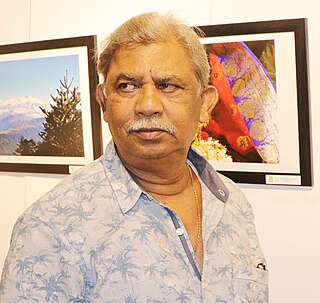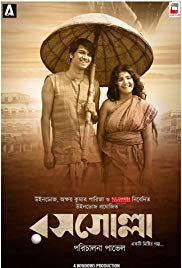
New Theatres is an Indian film studio. It was formed in Calcutta by producer B. N. Sircar. It was formed on February 10th, 1931. The company motto was "Jivatang Jyotiretu Chhayam," meaning, "Light infusing shadows with life." Sircar preferred to function roughly analogous to an executive producer. He built a processing laboratory, and acquired staff. Once a film subject was selected and a team assembled to create the picture, Sicar ensured that adequate funds were provided, while refraining from interfering with its execution. He made New Theatres a symbol of Bengali cinema's artistic good taste and technical excellence.

Cinema of West Bengal, also known as Tollywood or Bengali cinema, is the segment of Indian cinema, dedicated to the production of motion pictures in the Bengali language widely spoken in the state of West Bengal. It is based in the Tollygunge region of Kolkata, West Bengal, India. The origins of the nickname Tollywood, a portmanteau of the words Tollygunge and Hollywood, dates back to 1932. It was a historically important film industry, at one time the centre of Indian film production. The Bengali film industry is known for producing many of Indian cinema's most critically acclaimed global Parallel Cinema and art films, with several of its filmmakers gaining prominence at the Indian National Film Awards as well as international acclaim.

Raja Sen is an Indian film and television director and the winner of three National Film Awards from Kolkata, West Bengal, India. He is the father of Subhasree Sen and Sreyoshri Sen.
Khaled Choudhury was a theatre personality and artist of Bengal. He worked for various directors of both Bengali and Hindi plays, including Sombhu Mitra, Tripti Mitra, and Shyamanand Jalan in various capacities — creating the Stage, sets and costumes and later as music director. He was a bachelor. He has been awarded the Padma Bhushan for his contribution to theatre in India's Republic Day Honours List on 26 January 2012. He died on 30 April 2014 in Kolkata.
Durgeshnandini is a Bengali historical romance novel written by Indian writer Bankim Chandra Chattopadhyay in 1865. Durgeshnandini is a story of the love triangle between Jagat Singh, a Mughal General, Tilottama, the daughter of a Bengali feudal lord and Ayesha, the daughter of a rebel Pathan leader against whom Jagat Singh was fighting. The story is set against the backdrop of Pathan-Mughal conflicts that took place in south-western region of modern-day Indian state of Paschimbanga during the reign of Akbar.

The group theatre of Kolkata refers to a tradition in theatres in the Indian city Kolkata, which developed in the 1940s as an alternative to entertainment-oriented theatres. As opposed to commercial theatres, group theatre is "a theatre that is not professional or commercial", characterized by its tendency for experimentation in theme, content and production, and its aim of using the proscenium stage to highlight social messages, rather than having primarily making-money objectives.

Byomkesh was a 2014 Indian Bengali crime fiction television series based on the Bengali sleuth Byomkesh Bakshi created by Sharadindu Bandyopadhyay. The series starred Gaurav Chakrabarty, Saugata Bandyopadhyay and Ridhima Ghosh as Byomkesh Bakshi, Ajit and Satyabati respectively. The series premiered on 20 November 2014 on Colors Bangla channel and ended on 14 November 2015. This series is re-runned on 4 March 2024. The first episode was narrated by Sabyasachi Chakrabarty.
The 9th Annual Bengal Film Journalists' Association Awards was held on 1946, honoring the best Indian cinema in 1945.

Checkmate is an Indian Bengali television thriller series which aired on Star Jalsha from 21 January 2012 to 15 June 2012.
Dikshul is a 1943 Indian Bengali film directed by Premankur Atorthy. The film was produced by New Theatres Ltd, Calcutta. Its music direction was by Pankaj Mullick and the cinematographer was Rabi Dhar. The lyricist for the film was Kazi Nazrul Islam who was famous as the "Bidrohi Kavi". The film marked the entry of actress and singer Binota Roy as a playback singer. The cast included Mihir Bhattacharya, Chhabi Biswas, Tulsi Chakraborty, Ashu Bose, Sailen Chowdhury, Harimohan Bose, and Radharani.
Abhagin is a 1938 Hindi film directed by Prafulla Roy for New Theatres Ltd., Calcutta. A bilingual, it was made in Bengali language as Abhigyan. The film was based on a story by Upendranath Ganguly, with dialogue by A. H. Shore. R. C. Boral provided the music composition with lyrics for the Hindi version by Munshi Arzu, and by Ajoy Bhattacharya for the Bengali. The screenplay was by Phani Majumdar for whom it was his first independent film as a scriptwriter. Bimal Roy, who was to make a name for himself as a prominent Bengali and Hindi director, was the cinematographer for the film. The cast included Molina Devi, Prithviraj Kapoor, Vijay Kumar, Nemo and Bikram Kapoor.
Nabin Jatra was a Bengali drama film directed by Subodh Mitra. This film was released on 11 September 1953 under the banner of New Theatres. Pankaj Mullick was the music director of the movie.

Rosogolla is a 2018 Indian Bengali historical drama film directed and written by Pavel. Rosogolla marks the big screen debut of Ujaan Ganguly and Abantika Biswas. It is a fictionalized biopic of Nobin Chandra Das, a sweet maker from Kolkata, the inventor of Rosogolla.

Stree is a 1972 Indian Bengali language romantic action film directed by Salil Dutta. The film is based on the novel of Bimal Mitra by the same title and the era of the plot showing during the Second World War. Produced by Baby June Productions marking their second venture, it stars Uttam Kumar, Soumitra Chatterjee and Arati Bhattacharya in lead roles. The soundtrack of the film was composed by Nachiketa Ghosh, with the lyrics penned by Gauriprasanna Mazumder and Pulak Bandyopadhyay.
The West Bengal Film Journalists' Association Award for Best Male Playback Singer is given yearly by WBFJA as a part of its annual West Bengal Film Journalists' Association Awards for Bengali films, to recognize the best male singer of the previous year.
The West Bengal Film Journalists' Association Award for Best Actor in a Leading Role is given yearly by the WBFJA as a part of its annual West Bengal Film Journalists' Association Awards for Bengali films, to recognize the best actor of the previous year.
The West Bengal Film Journalists' Association Award for Best Actor in a supporting Role is given yearly by WBFJA as a part of its annual West Bengal Film Journalists' Association Awards for Bengali films, to recognize the best actor of the previous year.








